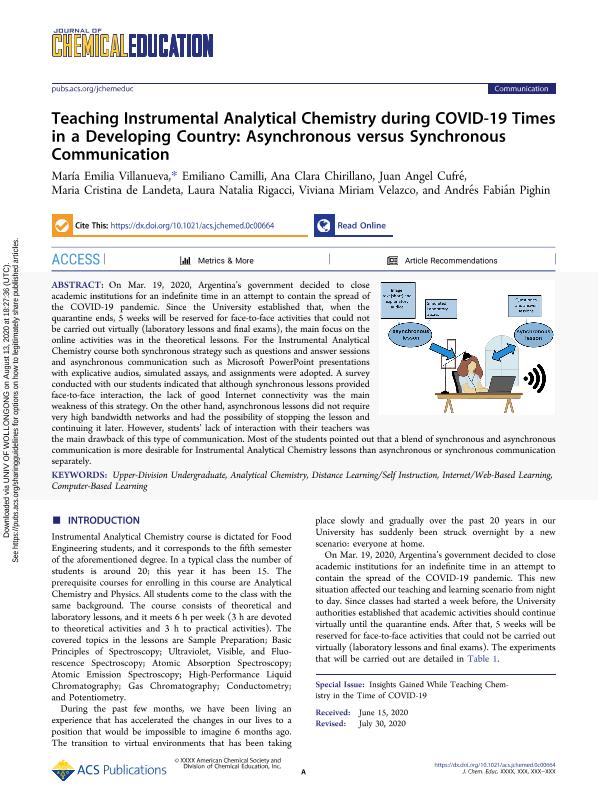Artículo
Teaching Instrumental Analytical Chemistry during COVID-19 Times in a Developing Country: Asynchronous versus Synchronous Communication
Villanueva, María Emilia ; Camilli, Emiliano; Chirillano, Ana Clara; Cufré, Juan Angel; de Landeta, María Cristina; Rigacci, Laura Natalia
; Camilli, Emiliano; Chirillano, Ana Clara; Cufré, Juan Angel; de Landeta, María Cristina; Rigacci, Laura Natalia ; Velazco, Viviana Miriam; Pighin, Andrés Fabián
; Velazco, Viviana Miriam; Pighin, Andrés Fabián
 ; Camilli, Emiliano; Chirillano, Ana Clara; Cufré, Juan Angel; de Landeta, María Cristina; Rigacci, Laura Natalia
; Camilli, Emiliano; Chirillano, Ana Clara; Cufré, Juan Angel; de Landeta, María Cristina; Rigacci, Laura Natalia ; Velazco, Viviana Miriam; Pighin, Andrés Fabián
; Velazco, Viviana Miriam; Pighin, Andrés Fabián
Fecha de publicación:
08/2020
Editorial:
American Chemical Society
Revista:
Journal Of Chemical Education
ISSN:
0021-9584
Idioma:
Inglés
Tipo de recurso:
Artículo publicado
Clasificación temática:
Resumen
On Mar. 19, 2020, Argentina’s government decided to close academic institutions for an indefinite time in an attempt to contain the spread of the COVID-19 pandemic. Since the University established that, when the quarantine ends, 5 weeks will be reserved for face-to-face activities that could not be carried out virtually (laboratory lessons and final exams), the main focus on the online activities was in the theoretical lessons. For the Instrumental Analytical Chemistry course both synchronous strategy such as questions and answer sessions and asynchronous communication such as Microsoft PowerPoint presentations with explicative audios, simulated assays, and assignments were adopted. A survey conducted with our students indicated that although synchronous lessons provided face-to-face interaction, the lack of good Internet connectivity was the main weakness of this strategy. On the other hand, asynchronous lessons did not require very high bandwidth networks and had the possibility of stopping the lesson and continuing it later. However, students’ lack of interaction with their teachers was the main drawback of this type of communication. Most of the students pointed out that a blend of synchronous and asynchronous communication is more desirable for Instrumental Analytical Chemistry lessons than asynchronous or synchronous communication separately.
Archivos asociados
Licencia
Identificadores
Colecciones
Articulos(IQUIMEFA)
Articulos de INST.QUIMICA Y METABOLISMO DEL FARMACO (I)
Articulos de INST.QUIMICA Y METABOLISMO DEL FARMACO (I)
Citación
Villanueva, María Emilia; Camilli, Emiliano; Chirillano, Ana Clara; Cufré, Juan Angel; de Landeta, María Cristina; et al.; Teaching Instrumental Analytical Chemistry during COVID-19 Times in a Developing Country: Asynchronous versus Synchronous Communication; American Chemical Society; Journal Of Chemical Education; 2020; 8-2020; 1-4
Compartir
Altmétricas



